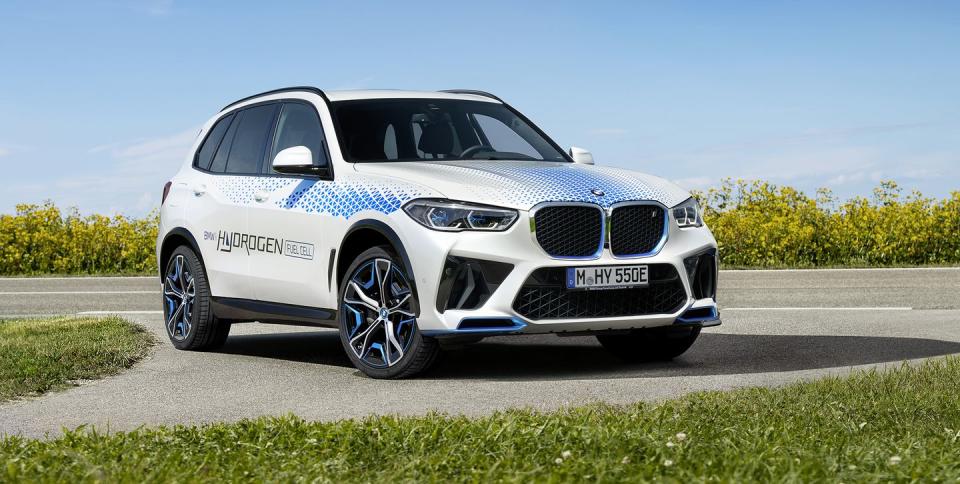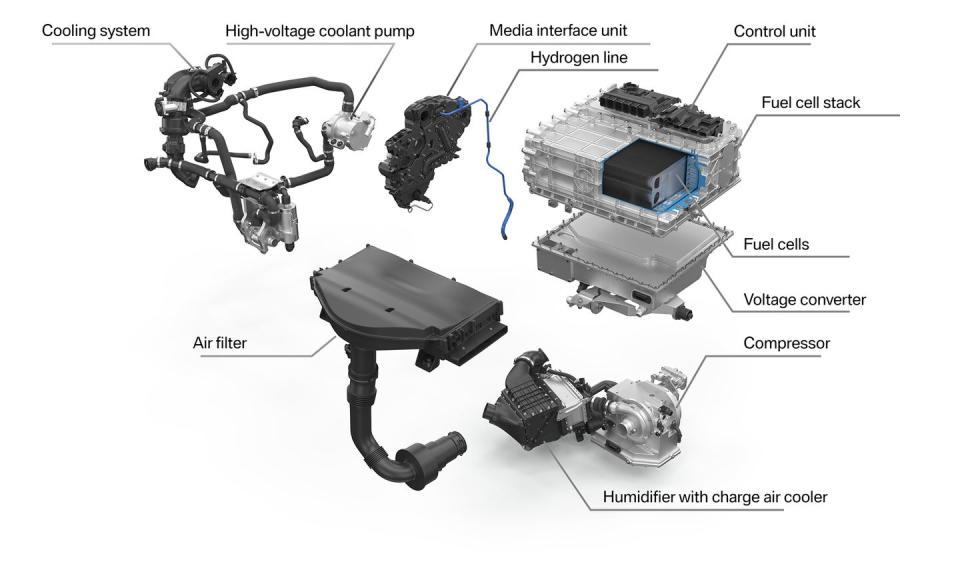BMW Begins Production of Fuel Cells for iX5 SUV

BMW gets ready for the start of small-series production of the iX5 Hydrogen SUV, dozens of which are scheduled to be built starting later this year.
The hydrogen fuel-cell X5 will produce a combined 374 hp, using fuel cells built by Toyota and assembled by BMW in Germany.
BMW has been experimenting with hydrogen for decades but isn't ready to field a vehicle that private consumers will be able to purchase.
The Munich-based automaker has begun building the hydrogen fuel cells that will go into its iX5 Hydrogen later this year, the company revealed, taking another step toward making this zero-emission technology more commonplace. The iX5 will be BMW's most significant hydrogen vehicle since the 7-Series experiments of the early 2000s, and the BMW 5-Series GT Hydrogen of 2015, but it will still see a small-series production run and will be used primarily for demonstration and testing purposes.
The individual fuel cells are sourced from Toyota—another major hydrogen tech supporter—and are assembled into a fuel-cell stack using a machine that compresses them with a force of five tons. The stack housing is produced by BMW in its light metal foundry at Landshut, using sand casting.
"Our many years of research and development work have enabled us to get the very most out of hydrogen technology," said Frank Weber, member of the Board of Management of BMW AG, Development. "We have managed to more than double the fuel cell’s continuous output in the second-generation fuel cell in the BMW iX5 Hydrogen, while weight and size have both decreased drastically."
The upcoming start of production of the iX5, whose hydrogen fuel-cell system is coupled with an electric battery to deliver a constant 374 hp, is certainly a step in BMW's desired direction, though not as large a step as its partner Toyota undertook with the Mirai. BMW plans to produce under 100 examples of the iX5, none of which will be sold or leased but rather used as test vehicles.
This makes the iX5 primarily an exercise in applying Toyota and BMW's hydrogen and EV tech to an existing vehicle, but it falls short of a real market launch, just as the automaker introduces multiple new EVs this year.

Munich's hydrogen efforts could be rapidly upstaged and outnumbered by a tsunami of new EVs, while still waiting for the number of hydrogen stations in Germany to reach critical mass. If that development occurs, an actual market launch of a hydrogen model could plausibly take place.
It's worth noting that BMW's projections of hydrogen stations, made in the early 2000s as it was experimenting with 7-Series cars (that used hydrogen as fuel in their V12 engines), have not come to pass in the two decades since. Just how much difference a third decade of waiting for the infrastructure to catch up will make, one that is seeing growing EV market share, remains to be seen. But it's notable that Toyota effectively threw in the towel in discontinuing the Mirai, and is now launching EVs of its own. Neither company has officially given up on the technology, but at some point in this decade a hard look at R&D budgets will have to be made.
"As a versatile energy source, hydrogen has a key role to play on the road to climate neutrality," said Oliver Zipse, chairman of the Board of Management of BMW AG. "And it will also gain substantially in importance as far as personal mobility is concerned. We think hydrogen-powered vehicles are ideally placed technologically to fit alongside battery-electric vehicles and complete the electric mobility picture."
Incidentally, where hydrogen tech is beginning to see some momentum is in trucks, with a German consortium seeking to establish hydrogen corridors between port cities and manufacturing centers focused on 18-wheelers.
Should BMW try to offer a hydrogen fuel-cell car to customers, or focus on EVs at this point? Let us know in the comments below.

 Yahoo Autos
Yahoo Autos 